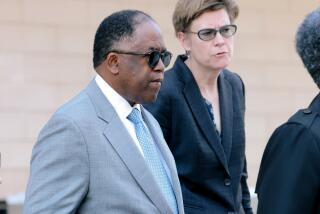U.S. Court Orders Lompoc Prison to Release Moriarty
The U.S. 9th Circuit Court of Appeals today ordered the release from prison of political corrupter W. Patrick Moriarty in a deal that was reluctantly approved by federal prosecutors.
Happy members of Moriarty’s family, all wearing yellow ribbons, drove in a van from the court in Pasadena to the Lompoc penitentiary this morning to bring him back to his home in Orange County.
U.S. Atty. Robert C. Bonner said Wednesday the government’s main reason for considering the early release of Moriarty was that his 1985 conviction on federal mail fraud statutes is likely to be reversed because of a U.S. Supreme Court decision last year.
Moriarty pleaded guilty to the mail fraud violations two years before a 1987 Supreme Court decision that severely restricts use of mail fraud statutes in political corruption cases. He is now asking the 9th Circuit Court to reverse his conviction.
In confirming the talks about freeing Moriarty, who has served 29 months of a five-year prison term, Bonner stressed that the government is facing “almost certain reversal” because of the Supreme Court case and more recent decisions further weakening mail fraud statutes.
“What we’re doing is seeing if we can salvage something to see that Moriarty is convicted of something,” Bonner said. “Quite frankly, if I had my druthers, I’d like to see him serve his term. But he will have served most of it, so he has been punished significantly.
“It’s unfortunate,” Bonner added. “It’s with reluctance that we are even having discussions.”
A three-judge panel of the 9th Circuit issued the release orders this morning in Pasadena in the Moriarty case, but the judges got a strong hint Wednesday from former Chief Assistant U.S. Atty. Richard E. Drooyan that they might be spared the task of deciding the case.
In the first public hint of the Moriarty negotiations, Drooyan said:
“We are having some settlement talks with Mr. Moriarty.”
Drooyan, now in private practice, headed the Moriarty investigation, which led to 11 convictions over a three-year period ending in 1987. He appeared before the 9th Circuit on Wednesday in connection with the appeal of another prominent figure in the Moriarty case, former Norwalk Assemblyman Bruce Young.
Young, who was convicted last year of five mail fraud counts and sentenced to 18 months in prison, has remained free while appealing his conviction on the same grounds cited by Moriarty--that the U.S. Supreme Court ruling nullifies mail fraud convictions that pertain only to “intangible” corruption in office.
The same 9th Circuit panel considering the Young case, composed of Judges William Norris, Eugene Wright and Charles E. Wiggins, is scheduled to meet today to listen to oral arguments in the Moriarty appeal.
After Wednesday’s hearing, however, sources said it is doubtful that the 9th Circuit will be given much of a role to play in deciding the Moriarty appeal.
Just moments after the Young hearing ended, Drooyan closeted himself with Moriarty’s lawyer, Jan Lawrence Handzlik, in a conference room at the 9th Circuit headquarters in Pasadena to discuss final details of the Moriarty negotiations.
Joining the two lawyers as the talks progressed were Moriarty’s wife, Doreen, and one of Moriarty’s daughters, Jean. When the conversations ended, Drooyan would confirm only that talks were proceeding. A smiling Handzlik was also cautious in his remarks.
“Discussions are under way seeking to resolve the Moriarty matter once and for all,” Handzlik said. “No final decision has been made by the U.S. attorney, but I am hopeful we will reach a decision by tomorrow morning.
“Our objective is to get Mr. Moriarty out of prison immediately,” Handzlik added. “He has already served a considerable period of time on mail fraud charges that have no validity.
“It should be remembered that Mr. Moriarty cooperated fully with the government over a three-year period of time and his testimony was critical,” Handzlik said. “The government should give him his freedom now.”
While severely restricted in pursuing any further mail fraud prosecutions, one option for the U.S. attorney’s office if Moriarty’s conviction is reversed would be to consider refiling racketeering and gambling charges against the Orange County millionaire.
Bonner, however, said there would have been significant legal problems in any effort by the government to reinstate charges that were dropped at the time of the plea bargain agreement.
“The legal obstacles to that would be significant,” Bonner said. “There would be problems in trying to reinstate anything in this case because it was a plea bargain.”
In the Young case, the 9th Circuit heard defense lawyer Donald Heller of Sacramento argue Wednesday that 130 mail fraud convictions have been reversed since the Supreme Court’s McNally decision in 1987.
Heller urged the 9th Circuit panel to not only reverse Young’s conviction, but to direct U.S. District Judge Dikran Tevrizian to dismiss the government’s indictment against Young. Such a move would ban future prosecution, Heller said, because the statute of limitations has expired on the crimes allegedly committed by Young in 1981 and 1982.
While the U.S. attorney’s office has now indicated it is, at the very least, leaning toward Moriarty’s release, sources say there is continuing interest in filing some new charges against Young in connection with his alleged corruption while a member of the state Legislature.
“We’ll cross that bridge when we come to it,” Bonner said. “I’d like to see what the 9th Circuit does with that first. Young did go to trial and was convicted while Moriarty entered into a plea agreement. We might have a better chance to reinstate with Young.”
More to Read
Sign up for Essential California
The most important California stories and recommendations in your inbox every morning.
You may occasionally receive promotional content from the Los Angeles Times.










